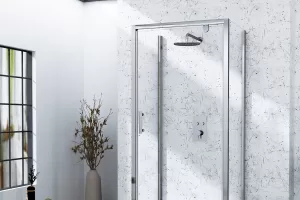
Eco Houses: The Essence of Sustainable Living in the UK
Eco houses represent the pinnacle of sustainable living in the UK, demonstrating an amalgamation of energy-efficient design, renewable energy adoption, and resource-saving features.
These houses, also known as ‘eco homes’ or ‘sustainable homes’, are constructed with meticulous attention to environmental impact, utilising a blend of modern technologies and sustainable materials.
From solar panels to high-performance insulation, each element ensures these homes are not just residences but bastions of environmental stewardship.
Such eco friendly houses go beyond mere energy savings; they reflect a holistic approach to living that values longevity, eco-consciousness, and a symbiotic relationship with nature. The design principles of these dwellings maximise natural light, incorporate living green spaces, and utilise non-toxic materials, thereby fostering well-being and a healthier lifestyle for their occupants.

Eco Houses and Their Market Value: Why Green Features Pay Off
In the UK property market, eco houses are increasingly recognised as not just desirable but also valuable investments. Their green features, including state-of-the-art insulation, smart home technologies, and on-site renewable energy generation, significantly enhance their market appeal.
Data shows that properties branded as eco houses tend to command higher prices, with buyers willing to invest more for the benefits of reduced utility bills and an eco-friendly lifestyle.
These eco homes also promise lower maintenance costs and the longevity of the eco-friendly materials used in their construction. The up-front investment in an eco house is frequently balanced by long-term financial savings and potential for increased resale value, making these properties particularly attractive to eco-conscious buyers and investors who prioritise sustainability.

Sustainable Valuations: How Eco Houses Are Reshaping the UK Property Market
The valuation of eco houses in the UK is experiencing a dynamic shift, with property professionals increasingly factoring in green credentials and energy performance into their assessments. A higher EPC (Energy Performance Certificate) rating can elevate a property’s value, and as such, eco houses are setting new benchmarks in the valuation process.
This market transformation is reflective of a broader societal shift towards sustainability, which is now becoming a significant determinant of property value.
Eco houses often sell more quickly and at higher prices than traditional homes, indicating a strong market preference. This preference is expected to grow, potentially leading to a valuation premium for eco-friendly features and positioning eco houses as a lucrative segment in the property market.
Eco Friendly Measures and Benefits For UK Houses
| Eco-Friendly Measure | Benefit |
|---|---|
| Solar Panels | Reduce electricity bills and carbon footprint. |
| Rainwater Harvesting Systems | Decrease water usage and save on utility costs. |
| LED Lighting | Lower energy consumption and longer lifespan. |
| High-Performance Insulation | Improve thermal efficiency and reduce heating costs. |
| Double Glazing Windows | Enhance heat retention and noise reduction. |
| Energy-Efficient Appliances | Save energy and reduce electricity bills. |
| Green Roof or Living Walls | Improve air quality and promote biodiversity. |
| Low-Flow Water Fixtures | Conserve water and reduce water heating costs. |
| Smart Home Thermostat | Optimise heating usage and increase comfort. |
| Eco-Friendly Building Materials | Support sustainability and reduce environmental impact. |
Consumer Demand for Eco Houses: Energy Efficiency as a Priority
Eco houses are becoming a priority for a substantial segment of the UK housing market, with buyers placing a premium on energy efficiency and sustainability. The drive towards eco friendly houses is fuelled by the dual benefits of personal cost savings and the collective impact on reducing carbon footprints.
This surge in demand reflects a broader cultural transition towards sustainability, with eco houses seen not only as personal dwellings but as part of a community-wide effort to combat climate change.
This demand for eco houses is mirrored in the shift towards responsible living, where buyers are actively seeking homes that minimise environmental impact and promote a sustainable lifestyle. Eco houses meet these demands head-on with innovative features that offer both immediate and long-term benefits, making them a top choice for eco-savvy buyers.
In recent years there has also been a trend towards living off grid in the UK, with owners taking a step further to not only reduce their bills, but to live in a more sustainable way.

Useful Property Resources:
Buying a woodland for sale with a cabin
Finding an abandoned property for sale in the UK
Build a house in the woods
The Financial Logic of Eco Houses: Weighing Costs Against Benefits
Investing in an eco friendly house often entails a higher initial outlay, but the long-term financial benefits are considerable. Owners of eco houses benefit from reduced utility costs, potential tax incentives, and higher resale values.
The investment in eco friendly houses is forward-thinking, with their value likely to increase as traditional energy costs rise and environmental regulations tighten.
The broader benefits, such as reduced healthcare costs due to healthier living environments and lower demand on the national grid, further underscore the societal value of eco houses. Incentive schemes and grants for eco-friendly upgrades have made it more economical for homeowners to transition to or invest in eco houses, solidifying their financial appeal.
Eco Houses in Practice: UK Case Studies
Real-world examples across the UK illustrate the economic and environmental success of eco houses. Developments that incorporate sustainable practices, from rainwater harvesting to solar energy systems, not only boast reduced carbon footprints but also demonstrate market resilience with higher valuations.
These case studies reinforce the premise that eco houses are not just beneficial for the environment but are also sound financial investments.
For instance, eco house retrofit projects in urban areas like London have shown that while retrofitting older properties with green technology involves significant investment, the result is a considerable increase in property value and desirability. Such examples provide compelling evidence for the viability and profitability of eco houses in the current UK market.

Legislation Driving the Eco Houses Market Forward
Government policies are increasingly supportive of eco houses, with initiatives designed to promote energy efficiency and sustainability in the housing sector. Eco houses benefit from these policies, which often provide financial incentives for sustainable building practices and energy-efficient renovations.
The future legislative landscape is poised to further bolster the market for eco friendly houses, as the UK strives to meet its climate targets and transition towards a greener economy.
Regulations are likely to become more stringent, favouring eco homes with advanced energy-saving features. As a result, the gap in market value between traditional homes and eco homes is expected to widen, with eco houses becoming the gold standard in the property market.
Looking Ahead: The Rise of Eco Houses as the Future of UK Housing
The trajectory of the UK property market suggests a bright future for eco homes, with sustainability becoming an integral aspect of housing demand and development. The evolution of eco houses reflects a profound change in societal values, prioritising long-term environmental health and energy conservation.
As the urgency for action on climate change mounts, eco houses stand at the forefront of this transformation, offering a viable path towards a more sustainable and economically beneficial living standard.
Return to UK Property Market Magazine


